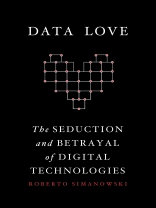Intelligence services, government administrations, businesses, and a growing majority of the population are hooked on the idea that big data can reveal patterns and correlations in everyday life. Initiated by software engineers and carried out through algorithms, the mining of big data has sparked a silent revolution. But algorithmic analysis and data mining are not simply byproducts of media development or the logical consequences of computation. They are the radicalization of the Enlightenment’s quest for knowledge and progress. Data Love argues that the ‘cold civil war’ of big data is taking place not among citizens or between the citizen and government but within each of us.
Roberto Simanowski elaborates on the changes data love has brought to the human condition while exploring the entanglements of those who—out of stinginess, convenience, ignorance, narcissism, or passion—contribute to the amassing of ever more data about their lives, leading to the statistical evaluation and individual profiling of their selves. Writing from a philosophical standpoint, Simanowski illustrates the social implications of technological development and retrieves the concepts, events, and cultural artifacts of past centuries to help decode the programming of our present.
Tabla de materias
Preface
Part I. Beyond the NSA Debate
1. Intelligence Agency Logic
2. Double Indifference
3. Self-Tracking and Smart Things
4. Ecological Data Disaster
5. Cold Civil War
Part II. Paradigm Change
6. Data-Mining Business
7. Social Engineers Without a Cause
8. Silent Revolution
9. Algorithms
10. Absence of Theory
Part III. The Joy of Numbers
11. Compulsive Measuring
12. The Phenomenology of the Numerable
13. Digital Humanities
14. Lessing’s Rejoinder
Part IV. Resistances
15. God’s Eye
16. Data Hacks
17. On the Right Life in the Wrong One
Epilogue
Postface
Notes
Index
Sobre el autor
Roberto Simanowski (Prof. Dr.) teaches Media Studies at the University of Basel.












